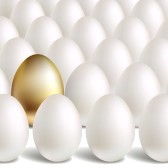Fertility treatment and early menopause – Will ovulation induction deplete a woman’s egg supply?
No. Fertility medications, prescribed by a fertility specialist like Dr. Erika Munch increase the chances for pregnancy, but not the rate at which a woman reaches menopause. However, there is still this myth about fertility treatment and early menopause.
“We are saving eggs, not stealing eggs,” explains Dr. Munch. “Women lose 100 eggs every month, whether or not they are undergoing
 Women usually release a single egg each month during ovulation. That explains why humans typically have one baby, and not twins or, as in other species, many babies at one time, says Dr. Munch. Every month, approximately 100 eggs vie for the opportunity to ovulate. A woman loses the immature eggs that do not develop into the dominant egg-containing follicle.
Women usually release a single egg each month during ovulation. That explains why humans typically have one baby, and not twins or, as in other species, many babies at one time, says Dr. Munch. Every month, approximately 100 eggs vie for the opportunity to ovulate. A woman loses the immature eggs that do not develop into the dominant egg-containing follicle.
Why there’s no link between fertility treatment and early menopause
“With ovarian stimulation, we are not using eggs that would have released in the future. We are utilizing more of the eggs that she would have lost in that menstrual cycle anyway.”
Dr. Munch points to a study published in Fertility and Sterility: Repetitive in vitro fertilization, as in egg donation, does not decrease serum anti Mullerian hormone (AMH) levels.
AMH testing, offered at Texas Fertility Center San Antonio, gauges a woman’s ovarian reserve by measuring the chemical present in very immature, primordial eggs. The study measured AMH levels in egg donors over the course of three to seven super ovulation cycles. The results did not show any significant decrease in AMH levels over time.
What Causes Early Menopause?
We know that ovarian stimulation does not cause early menopause. Dr. Munch explains that family history can predict your chances. Other risk factors include Fragile X syndrome, although rare in women, and certain autoimmune diseases.
It’s important to remember that fertility declines much earlier than the onset of menopause, and that egg health and egg supply steadily decline as a woman ages.
For this reason, the American Society for Reproductive Medicine suggests that couples who have tried to get pregnant for more than a year without success should seek help. If the female partner is over 35, it’s best to partner with a fertility doctor after six months.
“People have no idea that maternal age is a double whammy: Women lose eggs and eggs decline in quality with the passing of time. When your friends tell you to relax and wait and it will happen, tell them that you believe in taking proactive steps toward your goal of having children.”
Contact Texas Fertility Center for a consultative appointment with Dr. Erika Munch. Controlled ovarian stimulation is a proven therapy for women struggling with infertility.














Comments are closed.